B03
A combined perturbation and modelling approach to understand and modulate the interactions between brain oscillations underlying memory consolidation in human NREM sleep
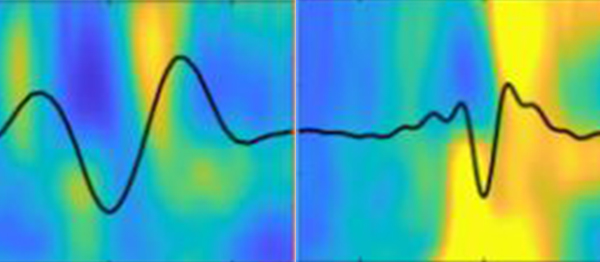
We combine experimental work in human subjects with computational modelling of neurophysiological events, which correlate with and possibly underlie sleep-dependent memory consolidation in humans. Our main goals are to mechanistically understand the spatiotemporal patterns of slow oscillations, δ-waves, spindle, and sharp-wave ripple activity, to infer mechanisms of spatially distributed systems memory consolidation underlying the observed spatiotemporal patterns, to mechanistically understand and predict the impact of transcranial current stimulation on these oscillatory events, and to design efficient stimulation protocols for manipulating those patterns.
Image Time frequency representation (TFR) in the frequency range of 5 to 20 Hz for SO (left) and delta (right) events. Courtesy of B03 members
Graphical Abstract
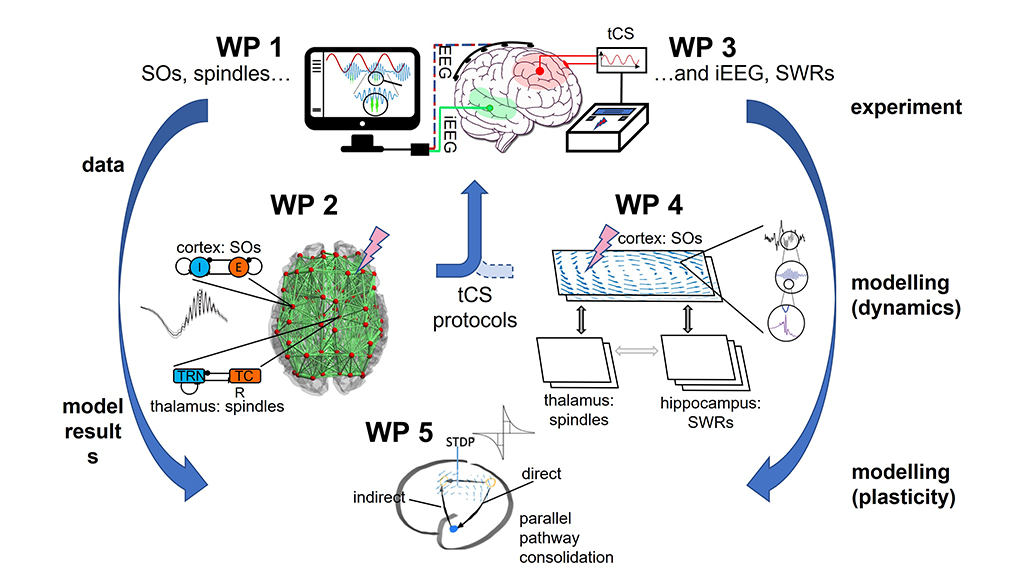
Graphical Abstract: Experimental work (PI Flöel) in human subjects includes non-invasive (WP 1) and invasive (WP 3) recordings of sleep rhythms with and without transcranial current stimulation (tCS) and accompanied by an assessment of memory performance. Data will be passed to the computational modelling of the dynamics of sleep rhythms (PI Obermayer: WP 2 – whole brain modelling on the basis of data from WP 1; WP 4 – mesoscale modelling on the basis of data from WP 3) and the impact of perturbations. Results will feed back to WP 1 in form of suggestions for novel tCS protocols for model validation. Results will be passed to WP 5 (PI Ritter) for computational modelling of the link between patterns of sleep rhythms and neural plasticity under the parallel pathway hypothesis of Remme et al., 2020, in a multi-scale modelling setting. SO: slow oscillations, SWR: sharp wave ripples, iEEG: intracranial EEG, STDP: spike-timing dependent plasticity.
Team
-
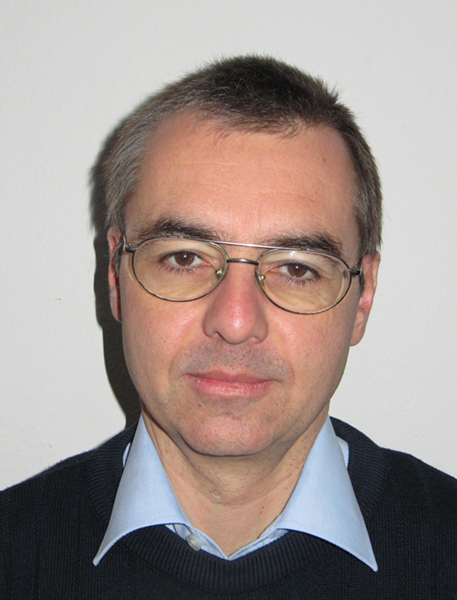
Prof Dr Klaus Obermayer
Technische Universität Berlin & BCCN
Head Neural Information Processing Group
-
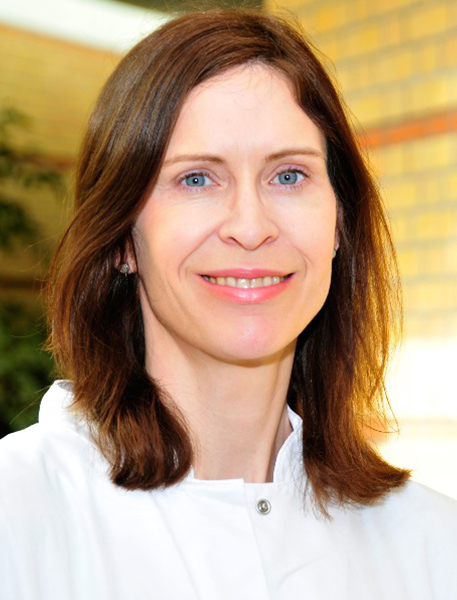
Prof Dr Agnes Flöel
Universitätsmedizin Greifswald
Chair, Department of Neurology
-
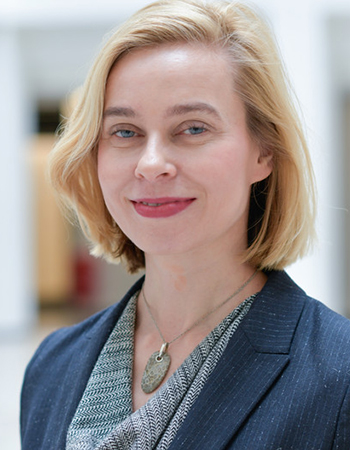
Prof Dr med Petra Ritter
Charité – Universitätsmedizin Berlin
Head of the Section Brain Simulation (CCM)
-
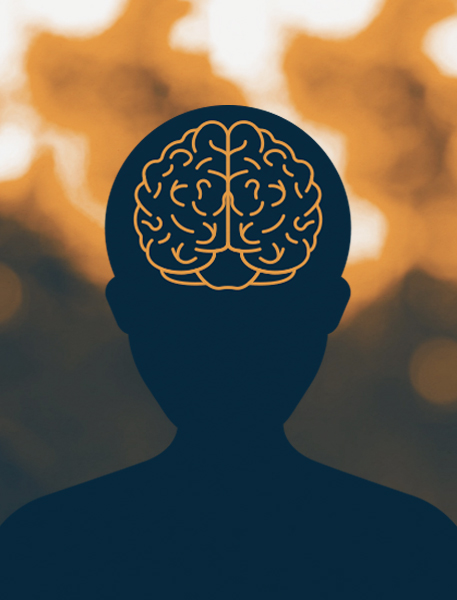
Dr Julia Ladenbauer
Universitätsmedizin Greifswald
B03 Associate Postdoc
-
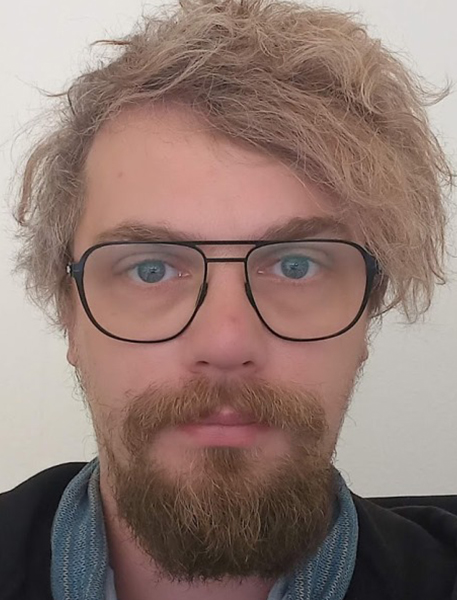
Robert Malinowski
Universitätsmedizin Greifswald
B03 PhD
-
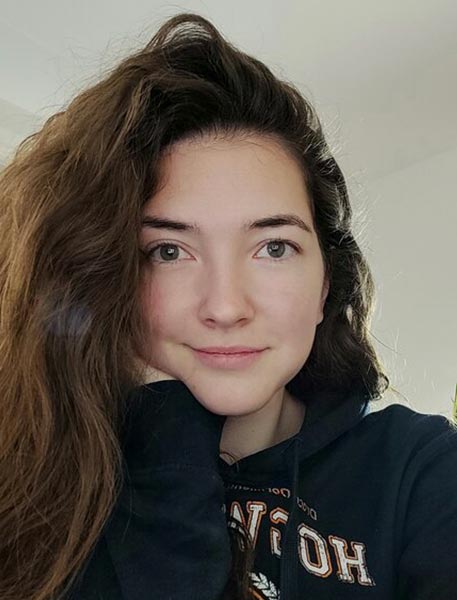
Ronja Strömsdörfer
Technische Universität Berlin
B03 Associate PhD
-
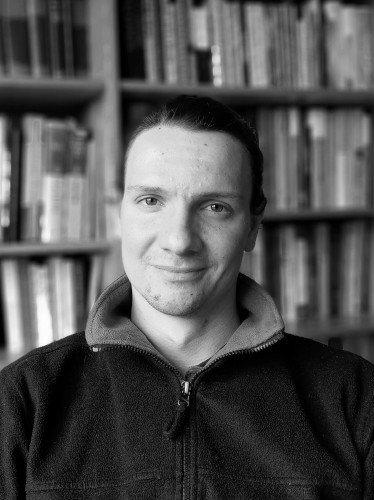
Jan-Bernhard Kordaß
Universitätsmedizin Greifswald
B03 Associate PhD
-
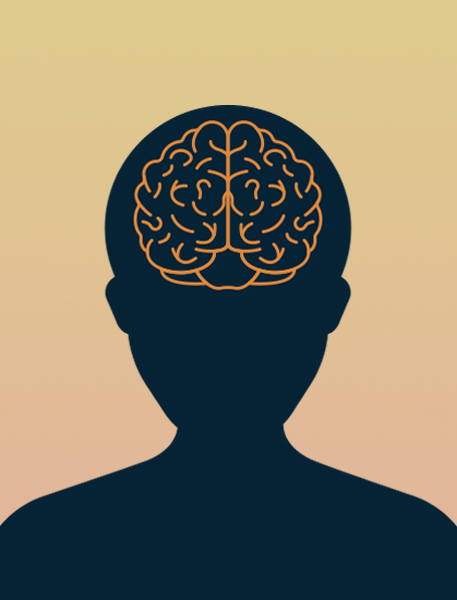
Buse Dikici
Universitätsmedizin Greifswald
B03 Associate PhD (AG Flöel)
-
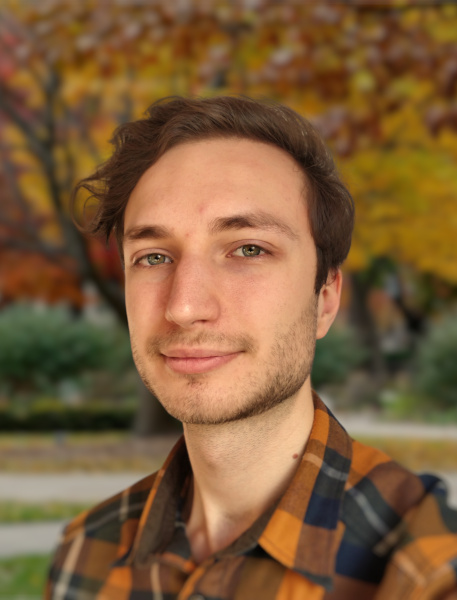
Georg Reich
Technische Universität Berlin
B03 Associate PhD
-
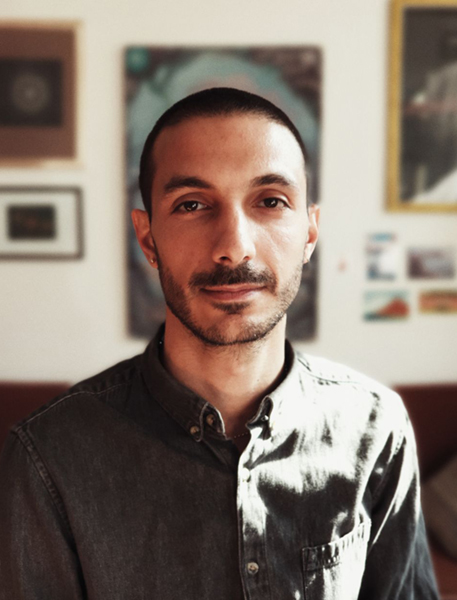
Caglar Cakan
Technische Universität Berlin
B03 Alumnus Postdoc
-

Cristiana Dimulescu
Technische Universität Berlin
B03 Associate PhD
-

Dr Jevri Hanna
Universitätsmedizin Greifswald
B03 Alumna
-

Dr Nikola Jajcay
Technische Universität Berlin
B03 Associate Postdoc
-

Melanie Marita Krüger
Universitätsmedizin Greifswald
B03 PhD (AG Flöel) Alumna
-
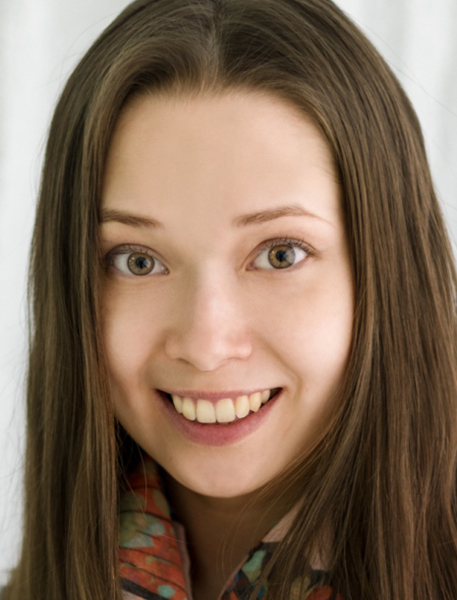
Liliia Shevchuk (Khakimova)
Universitätsmedizin Greifswald
B03 Alumna
-

Dr Daniela Obst
Universitätsmedizin Greifswald
B03 Alumna
-

Leonardo Pohl
Humboldt-Universität zu Berlin
Z alumnus 2018-2020, B03 Student Helper 2024-
-

Jessica Uhrich
Universitätsmedizin Greifswald
Student helper 2018-2019 - B03 Alumna
-

Larissa Stange
Universitätsmedizin Greifswald
Student helper 2020 - B03 Alumna
-

Sara Kriszik
Universitätsmedizin Greifswald
Student helper 2019-2020 - B03 Alumna
-

Kateryna Yarova
Universitätsmedizin Greifswald
Student helper 2018-2019 - B03 Alumna
Publications
Association of spermidine blood levels with microstructure of sleep – implications from a population-based study
Silke M. Wortha, Juliane Schulz, Jevri Hanna, Claudia Schwarz, Beate Stubbe, Stefan Frenzel, Robin Bülow, Nele Friedrich, Matthias Nauck, Henry Völzke, Ralf Ewert, Antje Vogelgesang, Hans J. Grabe, Julia Ladenbauer & Agnes Flöel
GeroScience. 46, 1319–1330 (2024)
Human connectome topology directs cortical traveling waves and shapes frequency gradients
Dominik P. Koller, Michael Schirner & Petra Ritter
Nat Commun. 15, 3570 (2024)
An accessible and versatile deep learning-based sleep stage classifier
Jevri Hanna and Agnes Flöel
Front Neuroinform. 17:1086634 (2023)
Microstructural and functional plasticity following repeated brain stimulation during cognitive training in older adults
Daria Antonenko, Anna Elisabeth Fromm, Friederike Thams, Ulrike Grittner, Marcus Meinzer & Agnes Flöel
Nat Commun. 14, 3184 (2023)
Improving the detection of sleep slow oscillations in electroencephalographic data
Cristiana Dimulescu, Leonhard Donle, Caglar Cakan, Thomas Goerttler, Lilia Khakimova, Julia Ladenbauer, Agnes Flöel, Klaus Obermayer
Front Neuroinform. 18:1338886 (2024)
Interrelations and functional roles of key oscillatory activities during daytime sleep in older adults
Larissa N. Wüst, Daria Antonenko, Robert Malinowski, Liliia Khakimova, Ulrike Grittner, Klaus Obermayer, Julia Ladenbauer, Agnes Flöel
J Sleep Res. 1–11 (2023)
Cognitive training and brain stimulation in patients with cognitive impairment: a randomized controlled trial
Daria Antonenko, Anna Elisabeth Fromm, Friederike Thams, Anna Kuzmina, Malte Backhaus, Elena Knochenhauer, Shu‐Chen Li, Ulrike Grittner and Agnes Flöel
Alzheimers Res Ther. 16(1):6 (2024)
Cross-frequency slow oscillation–spindle coupling in a biophysically realistic thalamocortical neural mass model
Nikola Jajcay, Caglar Cakan, Klaus Obermayer
Front. Comput. Neurosci. 16:769860 (2022)
Spatiotemporal patterns of adaptation-induced slow oscillations in a whole-brain model of slow-wave sleep
Caglar Cakan, Cristiana Dimulescu, Liliia Khakimova, Daniela Obst, Agnes Flöel, Klaus Obermayer
Front Comput Neurosci. 15:800101 (2022)
Towards optimization of oscillatory stimulation during sleep
Julia Ladenbauer, Liliia Khakimova, Robert Malinowski, Daniela Obst, Eric Tönnies, Daria Antonenko, Klaus Obermayer, Jeff Hanna, Agnes Flöel
Neuromodulation. 26(8):1592-1601 (2022)
Interrelations between delta waves, spindles and slow oscillations in human NREM sleep and their functional role in memory
Larissa N. Wüst, Daria Antonenko, Robert Malinowski, Liliia Khakimova, Ulrike Grittner, Klaus Obermayer, Julia Ladenbauer, Agnes Flöel
bioRxiv
Applications of optimal nonlinear control to a whole-brain network of FitzHugh-Nagumo oscillators
Teresa Chouzouris, Nicolas Roth, Caglar Cakan, Klaus Obermayer
Phys Rev E. 104(2-1):024213 (2021)
Virtual deep brain stimulation: Multiscale co-simulation of a spiking basal ganglia model and a whole-brain mean field model with The Virtual Brain
Jil M. Meier, Dionysios Perdikis, André Blickensdörfer, Leon Stefanovski, Qin Liu, Oliver Maith, Helge Ü. Dinkelbach, Javier Baladron, Fred H. Hamker, Petra Ritter
Exp Neurol. 354:114111 (2022)
Brain simulation as a cloud service: The Virtual Brain on EBRAINS
Michael Schirner, Lia Domide, Dionysios Perdikis, Paul Triebkorn,...., Agnes Flöel, ...Jochen Mersmann, Viktor Jirsa, Petra Ritter
NeuroImage. 251:118973 (2022)
Memory-relevant nap sleep physiology in healthy and pathological aging
Julia Ladenbauer, Josef Ladenbauer, Nadine Külzow, Agnes Flöel
Sleep. 44(7):zsab002 (2021)
Inter-individual and age-dependent variability in simulated electric fields induced by conventional transcranial electrical stimulation
Daria Antonenko, Ulrike Grittner, Guilherme Saturnino, Till Nierhaus, Axel Thielscher, Agnes Flöel
NeuroImage. 224: 117413 (2021)
Neurolib: A simulation framework for whole-brain neural mass modeling
Caglar Cakan, Nikola Jajcay, Klaus Obermayer
Cogn Comput. 1158(31) (2021)
Cognitive training and brain stimulation in prodromal Alzheimer’s disease (AD-Stim)—study protocol for a doubleblind randomized controlled phase IIb (monocenter) trial
Friederike Thams, Anna Kuzmina, Malte Backhaus, Shu-Chen Li, Ulrike Grittner, Daria Antonenko and Agnes Flöel
Alzheimer’s Res Ther. 12(1):142 (2020)
Biophysically grounded mean-field models of neural populations under electrical stimulation
Caglar Cakan and Klaus Obermayer
PLoS Comput Biol. 16(4):e1007822 (2020)
Weight loss reduces head motion: re-visiting a major confound in neuroimaging
Frauke Beyer, Kristin Prehn, Katharina A Wüsten, Arno Villringer, Jürgen Ordemann, Agnes Flöel, A Veronica Witte
Hum Brain Mapping. 41(9):2490-2494 (2020)
Cross-reactivity as a mechanism linking infections in stroke
Guglielmo Lucchese, Agnes Flöel, Benjamin Stahl
Front Neurol. 10:469 (2019)

